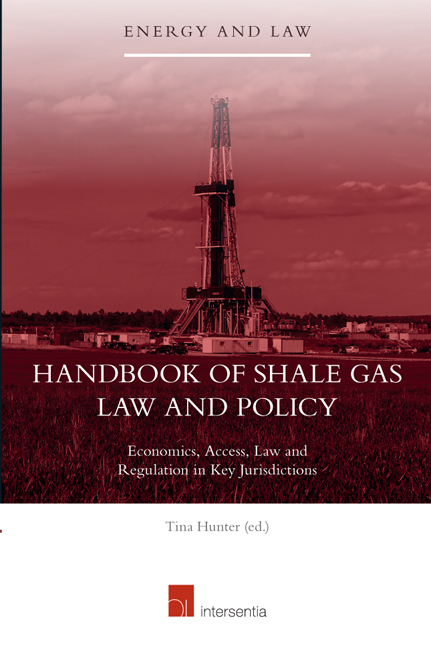Book contents
- Frontmatter
- Preface
- Contents
- List of Tables and Figures
- List of Authors
- Part I Overview and Introduction to Shale Gas Activities
- Part II Shale Gas Economics and Energy Security
- Part III Access to Shale Gas Resources
- Part IV Shale Gas Law and Regulation
- Part V The Future of Shale Gas in the United Kingdom
- Shale Gas and the Energy Policy ‘Trilemma’
- Future Trends in Shale Gas Law and Policy in the United Kingdom
- Index
Future Trends in Shale Gas Law and Policy in the United Kingdom
from Part V - The Future of Shale Gas in the United Kingdom
Published online by Cambridge University Press: 21 September 2018
- Frontmatter
- Preface
- Contents
- List of Tables and Figures
- List of Authors
- Part I Overview and Introduction to Shale Gas Activities
- Part II Shale Gas Economics and Energy Security
- Part III Access to Shale Gas Resources
- Part IV Shale Gas Law and Regulation
- Part V The Future of Shale Gas in the United Kingdom
- Shale Gas and the Energy Policy ‘Trilemma’
- Future Trends in Shale Gas Law and Policy in the United Kingdom
- Index
Summary
INTRODUCTION
The United Kingdom is poised tentatively on the edge of shale gas development. The first steps in this direction at Preese Hall near Blackpool in the spring of 2011 resulted in two minor seismic events that not only prompted government and academic inquiries, but also heralded in an era of public objection to shale gas development in the UK in general, and to the technique of hydraulic fracturing (HF), or ‘fracking’, in particular. Despite suggestions that the tremors induced were minor, the UK government clearly felt compelled to respond to public concerns.
The legal framework regulating the exploration for and production of shale gas was immediately subjected to close scrutiny. A temporary moratorium was imposed while the Preese Hall incident was investigated under the auspices of the Royal Society and the Royal Academy of Engineering (RS & RAE), the outcome of which was published as Shale Gas Extraction in the UK: A Review of Hydraulic Fracturing (the review). In addition, Cuadrilla, the operator of the shale gas exploration well at Preese Hall, commissioned a series of studies to examine to possible relationship between hydraulic fracturing and seismic activity. The Department of Energy and Climate Change (DECC) requested a review of these reports by three experienced academics and practitioners: Professor Peter Styles of Keele University, Dr Brian Baptie of the British Geological Survey, and Dr Christopher Green of G Frac Technologies (the expert team). The resultant report, Preese Hall Shale Gas Fracturing: Review and Recommendations for Induced Seismic Mitigation, addressed the question of whether HF as a practice in shale gas development is safe. It focused on aquifer contamination, well integrity and seismicity.
Following this comprehensive review of shale gas activites in the UK, some regulatory reform occurred and the moratorium was lift ed. However, the review, and subsequent legislative reform has so far failed to quell the public concerns regarding shale gas exploration. Such concern was displayed in the summer of 2013 at Balcombe, England in relation to the granting of permission to Cuadrilla to drill a shale gas exploration well within Petroleum and Development Licence (PEDL) 244 at a vertical depth of approximately 3,000 feet with a horizontal leg. Whilst the test well was commenced in August 2013, it was later scaled back due to the prolonged public protest.
- Type
- Chapter
- Information
- Handbook of Shale Gas Law and PolicyEconomics, Access, Law and Regulation in Key Jurisdictions, pp. 383 - 394Publisher: IntersentiaPrint publication year: 2016



